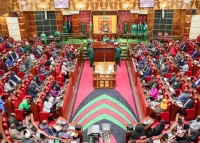According to a survey conducted by YouGov, last year, 31% of women stated that they had a “good to very good“ knowledge of finance. The figure this year is as high as 41%.
Women had an average of Ksh67,134.45 less per month at their disposal as a result of the pandemic. Consequently, 24% fewer women made investments compared to before the pandemic.
During the same period, stock exchanges experienced record levels of new registrations, with the shareholder ratio rising from 29% to 34% in the space of one year, as shown in the study.
According to UN Women, globally, 70% of health workers and first responders are women, and yet, they are not at par with their male counterparts. At 28 per cent, the gender pay gap in the health sector is higher than the overall gender pay gap of 16 %.
“For the last 22 years, extreme poverty globally had been declining. Then came COVID-19, and with it, massive job losses, shrinking of economies and loss of livelihoods, particularly for women. Weakened social protection systems have left many of the poorest in society unprotected, with no safeguards to weather the storm,” says Ginette Azcona UN Women’s Senior Research and Data Specialist.

The pandemic is expected to push 47 million women and girls to extreme poverty in 2021. This will bring the total number of women and girls living on Ksh208.62 or less, to 435 million globally.
READ ALSO>>>>>15 Inspiring Women in Corporate Africa
Poverty brought about by the pandemic would also increase the gender poverty gap primarily within the 25-34 age bracket.
The report by UN women stated that there will be 118 women aged 25 to 34 in extreme poverty for every 100 men aged 25 to 34 in extreme poverty globally, and this ratio could rise to 121 poor women for every 100 poor men by 2030.
“Women typically earn less and hold less secure jobs than men. With plummeting economic activity, women are particularly vulnerable to layoffs and loss of livelihoods,” stated Antra Bhatt, Statistics Specialist
The report further states that women-led industries such as food service, retail and entertainment experienced the hardest hit during the pandemic. 40% of all employed women – 510 million women globally – work in hard-hit sectors, compared to 36.6 % of employed men.
Globally, 58 per cent of employed women work in informal employment, and estimates suggest that during the first month of the pandemic, informal workers globally lost an average of 60 per cent of their income.
As quarantine measures kept people at home, closed schools and day-care facilities, the burden of unpaid care and domestic work greatly increased for both women and men.
However, even before COVID-19, women spent an average of 4.1 hours per day performing unpaid work, while men spent 1.7 hours. This translates to women doing three times more unpaid care work than men, worldwide.
Both men and women report an increase in unpaid work since the start of the pandemic, but women continue to be more disadvantaged, unlike their male counterparts.
The closing of schools and daycare facilities along with the reduced availability of outside help led to months of additional work for women. For working mothers, this has meant balancing full-time employment with childcare and schooling responsibilities.
“Impacts on education and employment have long-lasting consequences that, if unaddressed, will reverse hard-won gains in gender equality,” stated the UN Women report.













Leave a comment